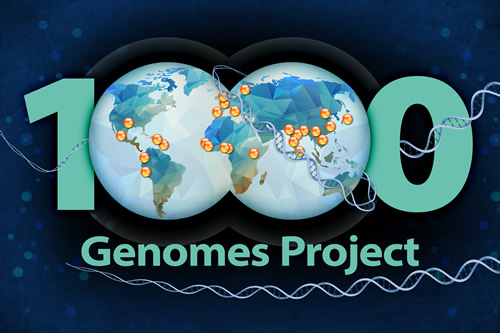Last updated: December 01, 2015
Nov3 2015 1000 Genomes Project
1000 Genomes Project
November 3, 2015
In October, NHGRI and its international collaborators successfully brought the 1000 Genomes Project to completion. As an important sequel to the Human Genome Project, this impressive effort initially aimed to identify and catalog 95% of the common human genomic variants (specifically, those 'DNA spelling differences' with a frequency of at least 1%). At its conclusion, the 1000 Genomes Project catalogued >99% of all common human genomic variants as well as many rare variants. The resulting resource is proving immensely valuable for studies that relate genomic variation to health and disease.
The international team of scientists working on the 1000 Genomes Project sequenced the genomes of 2,504 people from 26 populations around the world from five ancestral groups (West African, East Asian, South Asian, European, and the Americas). This reflects over 50% more sequenced genomes than originally proposed for the project- a massive overachievement! The resulting data - all of which has been made freely available - represent the world's largest catalog of genomic differences among humans.

Detailed analyses of the resulting >2,500 genome sequences led to the cataloguing of the different classes of genomic variants: single DNA base differences (81 million single-nucleotide polymorphisms, or SNPs), insertions and deletions (3.4 million), and larger structural polymorphisms (68 thousand). In total, the Project identified >84 million variant sites in the human genome.
To document the above accomplishments, the 1000 Genomes Project scientists published two papers in Nature: A global reference for human genetic variation and An integrated map of structural variation in 2,504 human genomes. Importantly, the 1000 Genomes Project Consortium was truly international in nature, including investigators from across the U.S., China, Germany, and the United Kingdom. 1000 Genomes Project funding from NHGRI began in Fiscal Year 2008, and has now concluded. The project was co-funded and co-led by the Wellcome Trust in the United Kingdom.
1000 Genomes Project data are proving to be highly valuable for studying both rare and common human diseases. For example, the data help investigators establish the frequency of any genomic variant that they encounter. These data are also powerful for studying the demographics and history of human populations. To aid all such studies, researchers can obtain DNA and cell lines from 1000 Genome Project participants through the NHGRI Sample Repository for Human Genetic Research at the Coriell Institute for Medical Research.

The 1000 Genomes Project is a stellar example of gifted scientific minds from across the globe coming together to create a valuable resource for the biomedical research community. The two recent Nature papers nicely showcase this resource, which is now actively used worldwide to advance understanding about the role of genomic variants in health and disease.
All 1000 Genomes Project data are available at 1000genomes.org. For the recent press release regarding the two Nature papers, see genome.gov/27562711/2015-news-release-scientists-create-worlds-largest-catalog-of-human-genomic-variation/. NHGRI's 1000 Genomes web site can be found at genome.gov/27528684/1000-genomes-project/.
Posted: December 1, 2015
